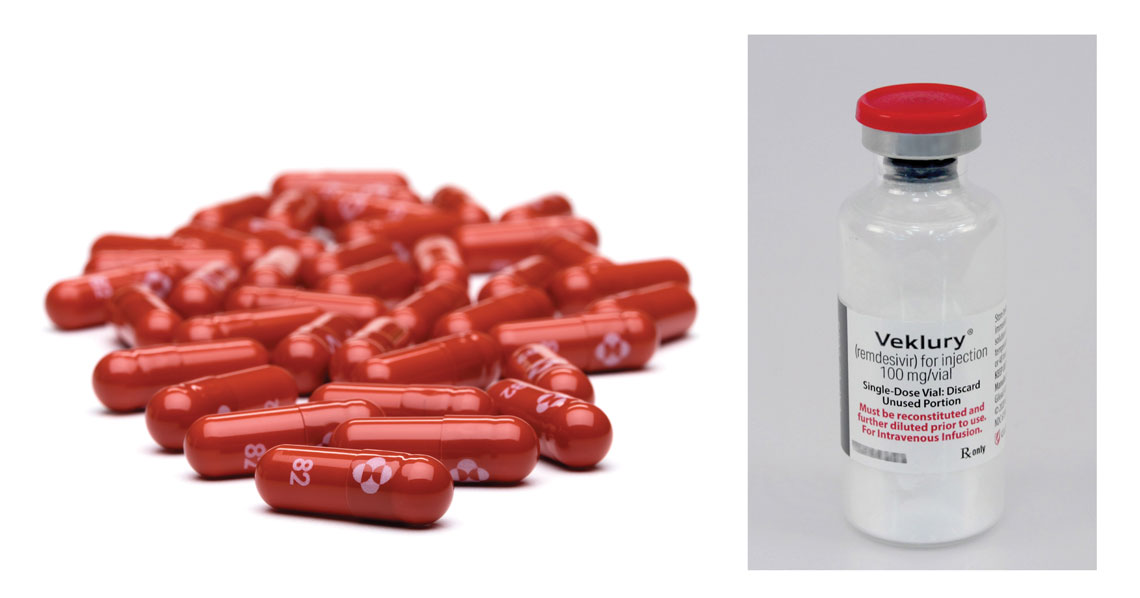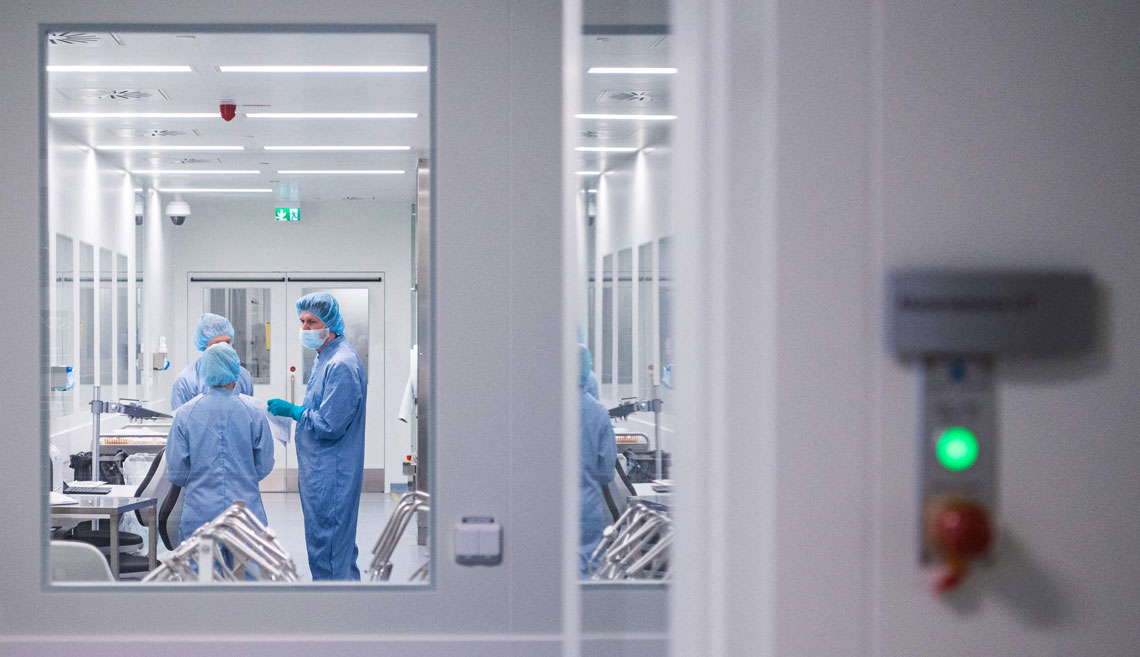The World Health Organization ended the global emergency status for COVID-19 last May 5th, three and a half years after its original declaration. During this period, COVID-19 infected 765 million people and, according to official data, resulted in 7 million deaths, with over 700,000 deaths occurring in Brazil alone (unofficial estimates indicate up to 20 million deaths globally from the disease). Vaccines were and remain the best defense against COVID-19. Meanwhile, efforts to develop effective medicines for treating the coronavirus infection and its associated disease, COVID-19, have encountered setbacks, some of them recent.
On March 7, the Brazilian Health Regulatory Agency (ANVISA), which regulates drug development in Brazil, temporarily revoked the emergency use authorization for Evusheld. The new cocktail, a combination of two human monoclonal antibodies — tixagevimab and cilgavimab — was previously indicated for preexposure prophylaxis of SARS-CoV-2 in adolescents and adults with weakened immune systems. Monoclonal antibodies are synthetic versions of human antibodies that bind to specific regions on the virus to prevent it from entering cells and replicating.
The decision to suspend the use of Evusheld in Brazil for this purpose came shortly after the Food and Drug Administration (FDA), the US counterpart of ANVISA, made the same decision in late January. The justification in both cases was that the medicine, manufactured by British-Swedish pharmaceutical company AstraZeneca, had shown decreased efficacy against coronavirus variants that were circulating at that time.
Another monoclonal antibody approved by ANVISA, sotrovimab, sold by GlaxoSmithKline (GSK) under the brand name Xevudy, is recommended for treating mild and moderate cases of COVID-19 in individuals predisposed to developing severe forms of the disease. The use of this drug against SARS-CoV-2 infection was also suspended in the US in April 2022. Although it has shown a decreased ability to neutralize the most recent variants, it is still being used in countries like the UK and Brazil.
Both Evusheld and sotrovimab target a specific region of the spike protein called the receptor-binding domain (RBD), which allows the virus to invade cells. This region is constantly evolving. For this reason, Álvaro Furtado, an infectious disease specialist at a teaching hospital run by the University of São Paulo School of Medicine (FM-USP), expects sotrovimab to soon lose its effectiveness against the virus. “These medications were tested during a different stage of the pandemic, with older variants and individuals with a less advanced vaccination status. We don’t expect any further monoclonal antibodies for coronavirus to be approved in Brazil,” says Furtado.
There have been similar challenges for another category of coronavirus drugs — antivirals — which have different mechanisms of action to antibodies. While antibodies are designed to prevent the virus from entering cells, antivirals impede SARS-CoV-2 from replicating once it has invaded the cells. At least three coronavirus antivirals are currently available in Brazil: remdesivir, developed by biopharmaceutical company Gilead Sciences and marketed as Veklury; Paxlovid, the brand name for a combination of nirmatrelvir and ritonavir developed by Pfizer; and molnupiravir, manufactured by Merck Sharp & Dome (MSD) and sold as Lagevrio. These medications are expensive and not always accessible via Brazil’s National Healthcare System (SUS). In addition, they must be prescribed within specific timeframes during the infection, typically within the first five days from the onset of symptoms.

Two antivirals available for COVID-19 treatment: molnupiravir (red capsules) and remdesivir (Veklury)MSD | Gilead
For example, remdesivir is solely available in private hospitals and is used for mild to moderate cases of pneumonia that require supplemental oxygen but not artificial ventilation (intubation). Molnupiravir and the combination of nirmatrelvir and ritonavir (Paxlovid) are claimed to reduce the risk of severe outcomes (hospitalization and death) by 30% and 88%, respectively, as per a study published in August 2022 in the journal Antimicrobial Agents and Chemotherapy. These drugs can be found in pharmacies at prices ranging from R$1,500 to nearly R$5,000 for a pack covering the entire treatment regimen. According to Furtado from USP, Paxlovid may be prescribed for individuals with mild to moderate symptoms of COVID-19 but at risk of progressing to severe disease. For severe cases with extensive lung involvement, Veklury may offer some effectiveness, although corticosteroids remain the most affordable and effective option for treating inflammatory conditions.
Some antivirals, such as remdesivir and molnupiravir, can also lead to the emergence of drug-resistant virus variants. They induce changes in the genetic material of SARS-CoV-2 that hinder viral replication. “However, it is possible that some nonlethal mutations may occur and facilitate virus replication,” explains Jordana dos Reis, a pharmacist and microbiologist heading the Basic and Applied Virology Laboratory at the Federal University of Minas Gerais (UFMG).
One hope is to identify more effective compounds with fewer side effects than existing, approved antivirals. “A derivative from Paxlovid or molnupiravir would be a welcome addition, particularly as the proportion of vaccinated individuals increases,” says Luciano de Azevedo, an intensive care physician and researcher at Hospital Israelita Albert Einstein and a member of the Brazilian COVID-19 Coalition, a collaboration for research on coronavirus drugs. He notes, however, that the rapid rate of virus evolution means this will not be an easy task.
One promising antiviral is ensitrelvir, a drug marketed as Xocova by Japanese pharmaceutical company Shionogi and currently authorized for emergency use exclusively in Japan. Data from a phase 3 clinical trial evaluating efficacy, conducted in Japan, Vietnam, and South Korea, was presented at an international conference in late February. The data suggests that the compound reduces recovery time for mild to moderate cases and, among treated patients, decreases the proportion of individuals who develop long COVID by 45% compared to the placebo group.
Alongside antivirals, Reis sees potential in anti-inflammatory drugs to assist in the treatment of severe cases. “Available antivirals often fall short in addressing these cases because, at this stage, viral activity has already peaked, leaving only inflammation and tissue damage in its wake,” she explains. In collaboration with researchers from the University of New South Wales in Australia, Reis is testing a combination of two compounds, bromelain and N-acetylcysteine, administered as a nasal spray. The new formulation has been patented as BromAc. According to results published in 2022 in Biomedicine and Pharmacotherapy, the drug has shown efficacy in laboratory tests in dissolving the spike protein, liquefying sputum, and reducing severe acute inflammatory response. The formulation is currently being evaluated in human subjects.
Scientific articles
ATMAR, R. L. & FINCH, N. New perspectives on antimicrobial agents: Molnupiravir and nirmatrelvir/ritonavir for treatment of Covid-19. Antimicrobial Agents and Chemotherapy. aug. 16, 2022.
SANDERSON, T. et al. Identification of a molnupiravir-associated mutational signature in Sars-CoV-2 sequencing databases. medRxiv. jan. 27, 2023.
COELHO-DOS- REIS, J. G. A. et al. Ex-vivo mucolytic and anti-inflammatory activity of BromAc in tracheal aspirates from Covid-19. Biomedicine & Pharmacotherapy. apr. 2022.
